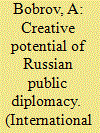|
|
|
Sort Order |
|
|
|
Items / Page
|
|
|
|
|
|
|
| Srl | Item |
| 1 |
ID:
165642


|
|
|
|
|
| Summary/Abstract |
MAKING the effective use of public diplomacy has for years been a keynote of all analytical studies devoted to soft power and its derivatives. Even though the concept of public diplomacy is clearly defined and has already entered the Russian political lexicon, the extent of its practical application is far behind the pace of scientific research and needs fleshing out in more detail. We believe that this can be ensured with the help of a person's social quality, such as creativity.
|
|
|
|
|
|
|
|
|
|
|
|
|
|
|
|
| 2 |
ID:
185042


|
|
|
|
|
| Summary/Abstract |
ON DECEMBER 8, 1991, the heads of three Union republics - Boris Yeltsin (Russian Soviet Federative Socialist Republic), Leonid Kravchuk (Ukrainian Soviet Socialist Republic), and Stanislav Shushkevich (Belarusian Soviet Socialist Republic) - signed the Belavezha Accords, dissolving the Soviet Union.1 That document was unprecedented in terms of international practice and its socioeconomic consequences for the once union state. It was followed two weeks later by the Alma-Ata Declaration, which eight other republics joined, and then by the resignation of Soviet President Mikhail Gorbachev. Many experts consider that truly epochal event the final act of the drama that Russian President Vladimir Putin described as "the greatest geopolitical catastrophe of the 20th century"2 - i.e., the collapse of the Soviet Union and a new reference point in the history of modern Russia, which, despite its turbulent centuries-old history, found itself overnight in a drastically altered political and economic reality. This December, many will recall those seemingly distant events in order to consider the main results of the three decades of Russia's foreign policy development as an independent state, which, like any person, goes through stages of development: childhood, adolescence, young adulthood, and maturity.
|
|
|
|
|
|
|
|
|
|
|
|
|
|
|
|
| 3 |
ID:
180707


|
|
|
|
|
| Summary/Abstract |
IN 2021, the Declaration on Cooperation between the Czech and Slovak Federative Republic, the Republic of Poland and the Republic of Hungary in Striving for European Integration1 that laid the foundation of the Visegrád Group will be 30 years old. These three decades have been filled with impressive successes and lamentable failures; with political ideas that kept them together or divided them. Moving to its next jubilee, the Group has preserved its importance in Europe supported by the Treaty of Accession of May 1, 2004, that made these countries EU members and has succeeded, to an extent, in attracting Brussels' political attention.
|
|
|
|
|
|
|
|
|
|
|
|
|
|
|
|
| 4 |
ID:
173277


|
|
|
|
|
| Summary/Abstract |
THE VITALY CHURKIN Moscow International Model UN (C-MIMUN),1 a Russian version of model United Nations (MUN), a worldwide educational project simulating UN activities, is one of the most-awaited key youth events at MGIMO University. It traditionally takes place in the spring, toward the end of an academic year, and is a one-week event in which hundreds of secondary school and university students from Russia and about a dozen foreign countries simulate activities by various bodies of the United Nations - its principal and subsidiary organs, specialized agencies, committees, commissions, funds and programs, and UN-related organizations.
|
|
|
|
|
|
|
|
|
|
|
|
|
|
|
|
|
|
|
|
|